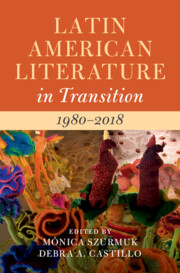Book contents
- Latin American Literature in Transition 1980–2018
- Latin American Literature in Transition
- Latin American Literature in Transition 1980–2018
- Copyright page
- Contents
- Contributors
- Acknowledgments
- Introduction
- Part I Security
- Part II New Genres
- Part III Mobilities
- Chapter 12 New Latinx/Chicanx Thought
- Chapter 13 The Boundless Dramas of Dancing Mulatas
- Chapter 14 Contemporary Stories of Deportation and Migration
- Chapter 15 The Language Shift of Literary Studies on Abiayala
- Chapter 16 South Asia and Latin America/Comparative Booms
- Part IV Positionalities
- Part V Latin American Literature in Global Markets
- Index
- References
Chapter 14 - Contemporary Stories of Deportation and Migration
from Part III - Mobilities
Published online by Cambridge University Press: 24 November 2022
- Latin American Literature in Transition 1980–2018
- Latin American Literature in Transition
- Latin American Literature in Transition 1980–2018
- Copyright page
- Contents
- Contributors
- Acknowledgments
- Introduction
- Part I Security
- Part II New Genres
- Part III Mobilities
- Chapter 12 New Latinx/Chicanx Thought
- Chapter 13 The Boundless Dramas of Dancing Mulatas
- Chapter 14 Contemporary Stories of Deportation and Migration
- Chapter 15 The Language Shift of Literary Studies on Abiayala
- Chapter 16 South Asia and Latin America/Comparative Booms
- Part IV Positionalities
- Part V Latin American Literature in Global Markets
- Index
- References
Summary
This chapter focuses on recently published personal stories of migration, whether in the form of narratives of migrants asserting their autonomy of movement as they confront ever more abundant and perilous challenges, or of repatriated migrants unable to respond to a highly fortified border industrial complex that subordinates them with ever harsher callousness and cruelty. These stories – a travel narrative by a Haitian migrant, a series of children’s books written by deported mothers, and a digital storytelling project – reflect recent phenomena that have yet to be taken up meaningfully in more prestigious and widely distributed works. The chapter focuses on testimonial genres, with the aim of understanding their effectiveness in communicating lived experiences within and across the open wounds of contemporary borders in the Americas and in relating the emotional consequences of forced displacement, undocumented border crossing, migrant criminalization, xenophobic violence, and detention and deportation regimes. These stories were all published with a certain urgency from what for many migrants remains the deepest, most painful, and longest-festering lesion in the Americas, the USA–Mexico borderlands. These stories’ poignancy is achieved less through literariness than from raw experience, as they document new dynamics of human displacement in the Americas.
- Type
- Chapter
- Information
- Latin American Literature in Transition 1980–2018 , pp. 215 - 230Publisher: Cambridge University PressPrint publication year: 2022

